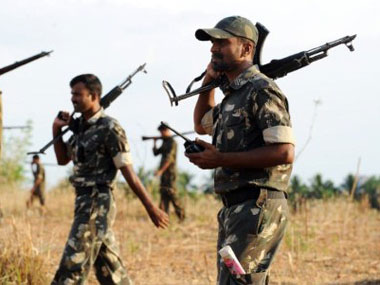Gandhians with guns. As the literary flight of bizarre imagination goes, the expression is a winner. It harmonises well the twisted bleeding heart sympathies for killers with an ideology and the convenient fiction woven around poverty and alienation in the tribal hinterland. It encapsulates the romantic thrill of the idea of rebellion and revolution too. But it is also a cover-up for stark criminality. It justifies ruthless killing of innocent people and the unending cycle of violence in the forests of the country. Check the numbers first. As many as 333 persons were killed in Naxal violence in the first seven months of the year. Those killed included 241 civilians and 92 security forces personnel. Last year, the Left rebels killed 534 people in 1,103 attacks. [caption id=“attachment_83776” align=“alignleft” width=“380” caption=“Most of the people killed were tribals – civilians suspected to be police informers or inimical to the interests of the Naxals. AFP”]  [/caption] According to statement of Home Minister P Chidambaram last year, Naxals killed three people in a day on average and there were six attacks daily. Terror attacks pale in significance. “The most violent movement in India is not terrorism or insurgency but Left wing extremism. While 26 people were killed in terrorist violence and 46 in insurgency till last month, 297 persons were killed in Naxal violence, ten times of those killed in terror incidents,” said Chidambaram on Tuesday while speaking at a workshop attended by collectors of 60 Naxal-hit districts of the country. Most of the people killed were tribals – civilians suspected to be police informers or inimical to the interests of the Naxals. The other killed included policemen of lower ranks, who are generally poor government officials running families with meager earnings. Nothing remotely romantic here. The Gandhians with guns are killing their own. There’s no ideology involved here; it’s just raw criminal intent at work. Their advocates in television studios and elsewhere should take note. If the broader issue is wellbeing of tribals in particular and the humanity in general, our sympathies cannot be selective. There is no way such murder can be justified. Rebelling against the state and taking to guns to protect one’s interest may be a fashionable, and poetic, notion — there’s no dearth of intellectuals subscribing to it — but it finally is a deadend street. The spiral of violence and counter violence would lead the country nowhere. Admitted, the governments, both at the Centre and the affected states, have been incompetent at addressing the issues of the tribals and build trust with them. Both have exposed tribal resources to reckless plunder and left people open to exploitation by outsiders and petty government officials. It has been going on for too long. There are enough existential woes which make the rebellion morally justifiable. The external support for it is justified too. But our Naxal sympathisers seem to have stretched things too far. The have started loving the problem instead of looking for solutions. It now appears they have created an ideological battlefield amid the grievances of the tribals. It serves their ideology if they perpetuate the existing situation. It’s difficult not to be cynical. With so many civil society groups involved in the troubled areas for so long and the government trying to be munificent with funds and support how come nothing is changing out there? It is possible that the Gandhians with guns have become addicted to power — why does a tribal rebel need an AK-47 and sophisticated weapons? — and the easy money it brings. It flies in the face of reason why they refuse an open dialogue with the governments at the central and state levels. To be fair to the latter, they have made repeated offers in the past and appear sincere in their effort to tackle the Naxal problem. The civil society members have not been too keen on playing a constructive role by facilitating a dialogue. It is easier to criticise the government — note how they go silent when Naxals cause death to civilians, derail trains etc — because it cannot cause much harm despite its size and powers. They are intelligent enough to manipulate public opinion in their favour to keep the trouble going. To cut a long story short, everybody loves a good problem.
It is easy to blame the governments in question for their failure to tackle Naxalism. But neither the Naxals nor their sympathisers look keen on a solution.
Advertisement
End of Article


)
)
)
)
)
)
)
)
)



